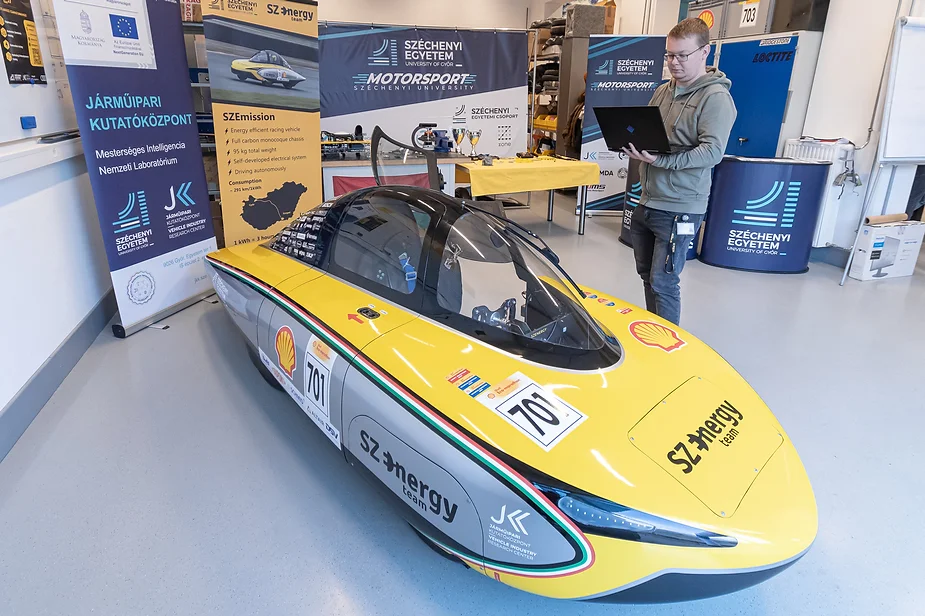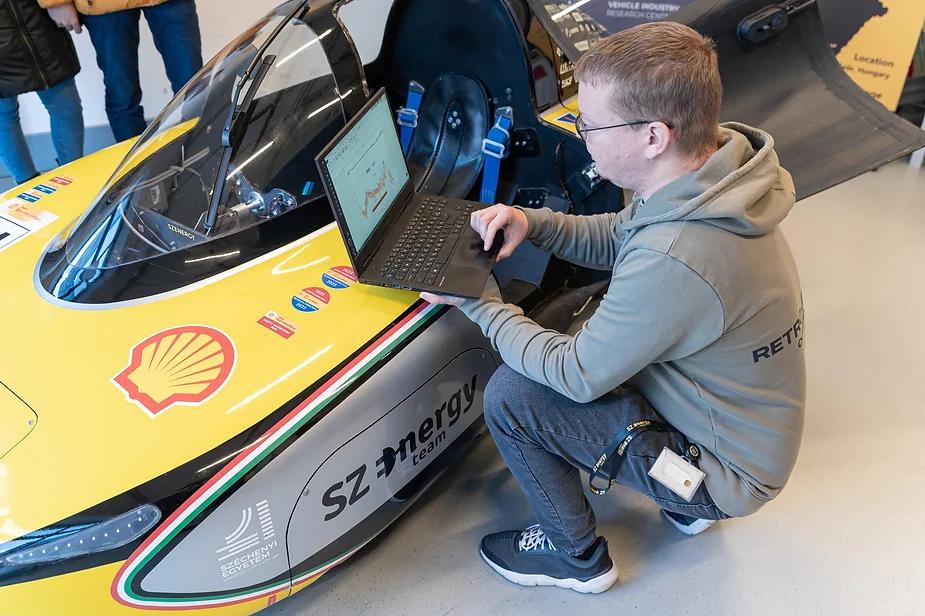In addition to the mobility-related research, development and training activities of Széchenyi István University, it has also made significant achievements in several areas of automotive motor sport. Many students put the knowledge and experience gained during their studies to good use in the technical crews of racing teams. They are the data analysts who can cut hundredths or tenths of a seconds off from the results, which sometimes lead to world championship titles.
Széchenyi István University has strong technical roots and is committed to technological innovation. Mobility is present in many areas of research, development and training, from self-driving vehicles to electric transport.
Students can put their engineering skills to work in outstanding student teams such as the European-leading Arrabona Racing Team, which competes in the Formula Student series, the closely collaborating SZEngine engine development team and the SZEnergy Team, which broke its own world record last year in Europe’s biggest energy efficiency competition.
Many of them claim that once you get a taste of this world, it’s hard to get away from it, and you don’t really want to.

Péter Kőrös, Head of Operations at the Centre for Autonomous Transport Systems of the University’s Centre for Automotive Research, helps racing teams as a data analyst in addition to his daily work (Photo: András Adorján)
„Since 2017, I have been doing data analysis for various racing teams in the world of go-karting. Building on the knowledge I gained at Széchenyi University and drawing on many years of experience, I have been able to achieve increasingly significant results. I am proud to have helped several drivers to Hungarian championship titles, first with Hargitai Racing and then with KMS Europe in Győr. The year 2023 brought the most significant successes, at one of the biggest karting events in the world, the Rotax Max Challenge Grand Finals. Áron Krepcsik, sponsored by the Humda Hungarian Mobility Development Agency, a member of the Széchenyi University Group, finished second in the world championship. I also had the opportunity to help Ben Cooper from Canada, who won his category,” said Péter Kőrös, Head of Operations at the Centre for Autonomous Transport Systems at the University’s Centre for Automotive Research.
He supports students as a mentor in the SZEnergy Team. He stressed that the institution’s racing teams provide an excellent opportunity for young people interested in motor sport to get a taste of the world, test their engineering skills and gain experience that can be a huge competitive advantage in the job market. These teams have already produced a number of young people who have stayed involved in technical sports after their studies, with several former students and staff members of the university helping pilots with their professional skills.
„There are those who provide telemetry and engineering services in motorsport, and those who have helped a number of teams as a freelancer, including Norbert Michelisz’s World Touring Car Championship-winning team, M1RA. Several of our former students and colleagues are involved in KMS Győr and other national teams, but there are also some who are part of Klausz Motorsport, which we saw at the Győr Rally,” he said.

As a mentor of the SZEnergy Team, the expert says that the student teams of Széchenyi University are a great opportunity for students. (Photo by András Adorján)
It was a moment in sporting history when the contestants of the WHB Győr Rally, which was held for the first time last year, arrived on the campus of the institution. The university hosted the high-speed stage, while Humda was the title sponsor of the event. Kristóf Klausz a student of the Széchenyi István University also participated in the rally, with several members of his team being fellow students. Bálint Kovács who is competing in the World Endurance Championship (EWC) is also a student of the university.
„It is important that the knowledge that we have accumulated over the years is reflected in our university courses. In the field of motorcycling, the institution already has a highly popular specialised further training course, the ‘Integrated Motorcycle and Racing Engineer’ course. It is characterised by personalities such as our former student and world speed motorcycle champion Gábor Talmácsi as instructors. In the future, specialised training courses – including micro-certificates – may be launched in the field of motor sport, which will make data analysis engineers even better prepared, thus raising the standard of Hungarian motor sport even further„, concluded Péter Kőrös.






